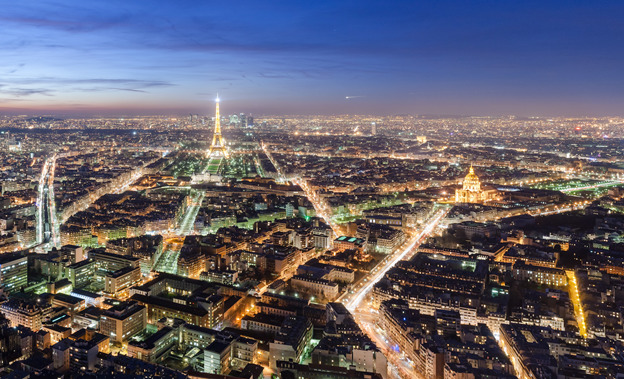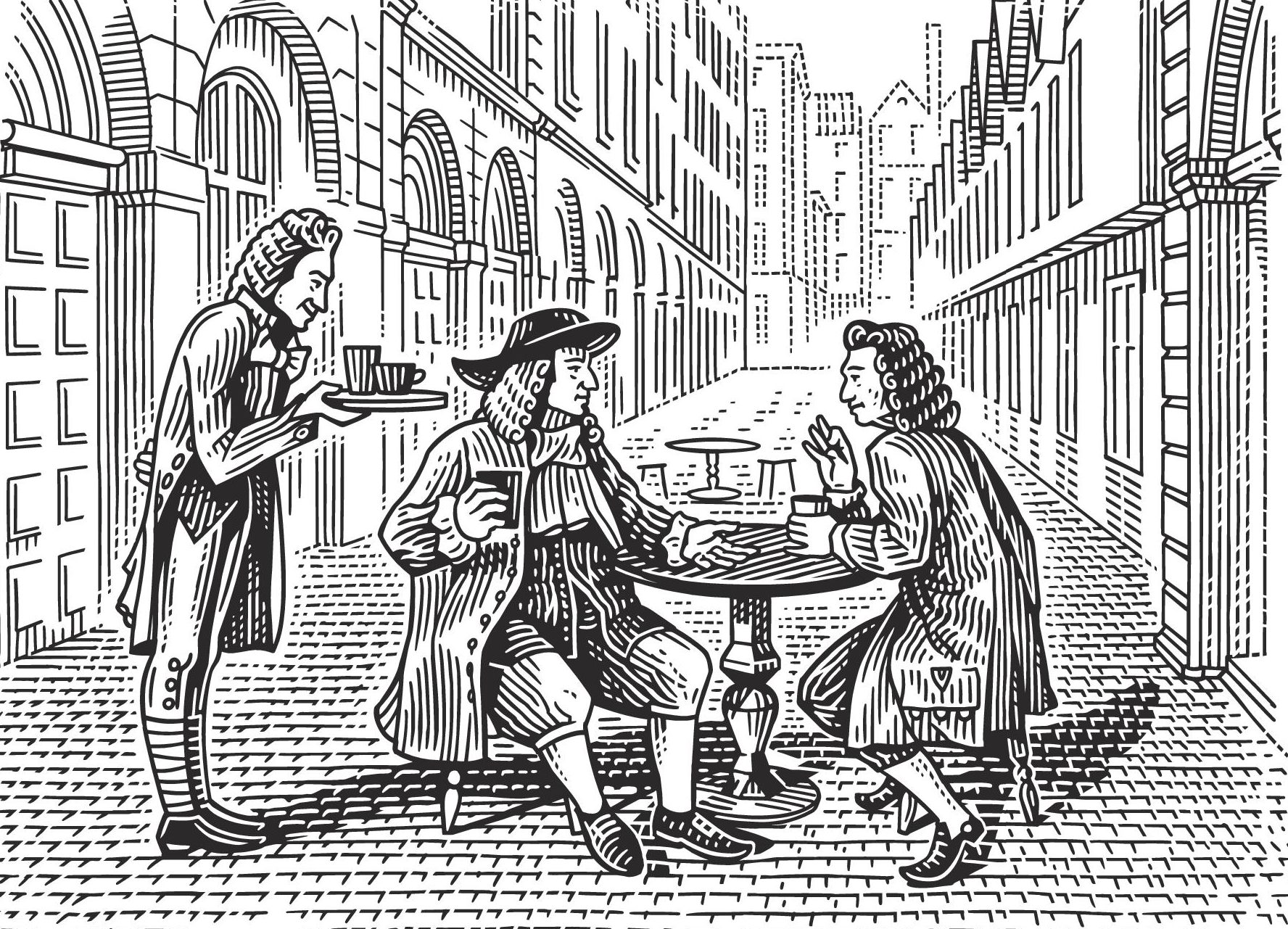Today marks the seventeenth installment in a series of articles by HumanProgress.org called Centers of Progress. Where does progress happen? The story of civilization is in many ways the story of the city. It is the city that has helped to create and define the modern world. This bi-weekly column will give a short overview of urban centers that were the sites of pivotal advances in culture, economics, politics, technology, etc.
Our seventeenth Center of Progress is Paris, sometimes called the “center stage” or “home” of the Enlightenment. The salons and coffeehouses of 18th century Paris provided a place for intellectual discourse where philosophes birthed the so-called Age of Enlightenment. The Enlightenment was a movement that promoted the values of reason, evidence-based knowledge, free inquiry, individual liberty, humanism, limited government, and the separation of church and state. While a long-distance intellectual community, known as the Republic of Letters (Respublica literaria), fostered communication among intellectuals across borders and oceans, Paris nonetheless served as an important geographical center of intellectual life. As Paris became a global capital of philosophy known for its intellectuals’ challenging of traditional beliefs, it earned the nickname “the City of Light” (“la Ville Lumière”). It is undeniable that the city’s thinkers and the broader Enlightenment movement altered history. Some scholars such as Harvard University psychologist Steven Pinker credit Enlightenment values with much of the scientific and moral progress humanity has made since then.
Today, Paris remains France’s capital and most populous city, with over two million residents. The city continues to serve as a significant center of diplomacy, commerce, high fashion, cuisine, science, and the arts, as it has done since at least the 17th century. Paris is one of the world’s top tourist destinations, famed for its architectural landmarks, museums, restaurants, and charming atmosphere. For its romantic reputation, one of the city’s nicknames is “the City of Love.” Paris is thus also a popular destination for weddings and honeymoons. The mystique that Paris holds in the public imagination is difficult to encapsulate, but the words of the Nobel Prize-winning theoretical physicist Walter Kohn perhaps best sum up the aspect of the city that concerns us: “Paris somehow lends itself to conceptual new ideas… There is a certain magic to that city.”
The site where Paris now stands has been inhabited since around 7600 BC. The city’s museums maintain archeological artifacts dating to the Stone Age and the Roman Empire, although those are not periods of history that are commonly associated with Paris. What began as a small settlement on the Seine river banks, grew rapidly in population and political importance. Paris gets its name from an Iron Age Celtic tribe, the Parisii, who fortified the area around 225 BC. In 52 BC, the Romans conquered the site and named it Lutetia Parisiorum, Marsh of the Parisii. By the 3rd century AD, local Germanic tribes challenged the Roman rule of the city. By the end of the 5th century AD, Paris came under the complete control of the Franks, a confederation of Germanic tribes. In 508 AD, the Franks made Paris their capital. In 843 AD, the kingdom of Francia split, with East Francia becoming the predecessor state to Germany and West Francia becoming the earliest iteration of the Kingdom of France. As France’s political influence expanded over the centuries, Paris became an important economic and cultural hub.
In the 18th century, the center of cutting-edge intellectual discourse shifted from universities to coffeehouses and salons, where controversial thinkers could find financial backing. Europe’s adoption of coffee substituted the continent’s constant consumption of alcohol, a depressant, with caffeine, a stimulant, and coffeehouses became hubs for the debate of politics and philosophy. Women played an important, if unequal, role in the Enlightenment. Wealthy or well-connected women known as salonnières—such as Marie Thérèse Rodet Geoffrin (1699–1777), who is sometimes called the inventor of the Enlightenment salon—hosted the era’s upscale intellectual gatherings. Even upper-class women at the time were typically denied formal educational opportunities, but the salons served as a socially-acceptable way for women to engage in intellectual life. Other key salonnières included Jeanne Julie Éléonore de Lespinasse (1732–1776) and Suzanne Necker (1739–1794), the Swiss wife of King Louis XVI’s finance minister.
In Enlightenment-era salons, nobles and other wealthy financiers intermingled with artists, writers, and philosophers seeking patronage and opportunities to discuss and disseminate their work. The gatherings gave controversial philosophers, who would have been denied the intellectual freedom to explore their ideas in the academy, the freedom to develop their critiques of existing norms and institutions. Influential Parisian and Paris-based thinkers of the period included the Baron de Montesquieu (1689–1755); François-Marie Arouet, better known by his pen name Voltaire (1694–1778); the Genevan ex-pat Jean-Jacques Rousseau (1712–1778); and the writer Denis Diderot (1713–1784).
While the salons were famous for sophisticated conversations and intense debates, it was letter-writing that gave the philosophes’ ideas a wide reach. A community of intellectuals that spanned much of the Western world—known as the Republic of Letters—increasingly engaged in the exchanges of ideas that began in Parisian salons. Thus, the Enlightenment movement based in Paris helped to spur similar radical experiments in thought elsewhere (such as the Scottish Enlightenment that is the subject of our next installment of Centers of Progress).
Thanks in part to funding and feedback provided by salon patrons, Paris’s philosophes put many of their ideas to paper. In 1748, Montesquieu published Spirit of the Laws, which advocated a separation of governmental powers. He posited that no single branch or part of government should have too much power relative to any other, which at the time was a groundbreaking proposition.
In 1751, Diderot helped create the Encyclopédie, among the first modern, general-purpose encyclopedias. Over 27 years, he served as its chief editor and helped to produce 28 different volumes of the Encyclopédie. The controversial book series was banned by both the Catholic Church and the French government, so he had to go into hiding to complete the final volumes. The production of the Encyclopédie has been called the seminal intellectual achievement of the French Enlightenment.
In 1759, Voltaire published his best-known work, Candide, a sarcastic novella that was also widely banned for its criticisms of religious and political institutions. While Parisian by birth, Voltaire spent relatively little time in Paris due to frequent exiles occasioned by the ire of French authorities. Voltaire’s time hiding out in London, for example, enabled him to translate the works of the political philosopher and “father of liberalism” John Locke, as well as the English mathematician and physicist Isaac Newton.
In 1762, Rousseau published The Social Contract, which argued, among other things, that laws should reflect the “will of the people” and that monarchs have no “divine right” to rule. This work, too, was censored. His ideas proved influential among the leaders of the French Revolution a generation later (1789–99). That said, some scholars consider Rousseau to have been a counter-Enlightenment figure due to his skepticism of modern commercial society and highly romanticized view of primitive existence.
The Enlightenment blossomed in 18th century Paris largely thanks to the efforts and generosity of private individuals. There were many attempts by the authorities to stifle new ideas that challenged the existing order. The French government often censored or banned writings and exiled intellectuals. But private funding, funneled to trailblazing thinkers through the salons, allowed new ideas to take root and thrive.
Other cultural developments were also occurring in Paris at the time. The city is the birthplace of haute cuisine and restaurants. During the 1760s and 1770s, the first modern restaurants emerged in France. In 1782, the pastry chef to the future Louis XVIII, Antoine Beauvilliers (1754–1817), opened the first prominent fine-dining establishment in Paris. As the monarchy weakened and more court chefs left their posts to open restaurants, the nouveau riche helped sustain the new establishments and fund the culinary arts’ development. French cuisine remains a significant cultural achievement that continues to be a source of pride for Parisians.
During the 18th century, Paris was also a center of music and opera, painting (particularly within the Baroque, Rocaille, and neoclassical artistic movements), and fashion (as the city had been for a century thanks to the elaborate clothes of the Sun King’s court). But it was the new ideas of the Enlightenment that defined the city in that era and ultimately transformed the world. Enlightenment ideals helped to bring about the French Revolution, which caused horrific bloodshed and chaos, but also showed that it was possible to rethink centuries-old institutions.
In other words, by providing a home base for the Enlightenment and the far-ranging Republic of Letters, Paris helped to spread new ideas that would ultimately give rise to new forms of government. The Enlightenment ideals of republicanism, separation of government powers, separation of church and state, and respect for civil liberties, helped to animate the French and American revolutions. The Enlightenment emphasis on reason and evidence helped to lay the groundwork for life-changing innovations in science and technology. The Enlightenment, in some ways, helped to pave the way for the later Industrial Revolution, a turning point in human history that created unprecedented wealth and eventually raised living standards to previously unimaginable highs.
Thanks to new technologies, the city’s nickname, the City of Light, developed a double-meaning, as Paris became among the first cities to install gas street lighting along its boulevards and monuments in the 19th century. Between 1853 and 1870, Paris installed some 15,000 gas streetlights. The 19th century also saw Parisian artistic achievements reach new highs with the erection of architectural marvels such as the iconic Eiffel Tower and the production of impressionist and post-impressionist masterpieces. There were too many groundbreaking French painters of the era to name. Still, some of the more influential ones include Claude Monet, Paul Cézanne, Edgar Degas, Édouard Manet, Pierre-Auguste Renoir, Georges-Pierre Seurat, Henri Rousseau, and Vincent Van Gogh. That era also saw new heights of French literature with well-known writers such as Victor Hugo, Honoré de Balzac, and Alexandre Dumas.
Today, Paris continues to be renowned the world over as a center of high culture. However, it no longer has the same reputation it did in the 18th century as the world’s intellectual capital.

Through a flourishing of private funding for new ideas, including controversial ones, 18th century Paris became the cradle of the Enlightenment and the geographical base of the far-ranging Republic of Letters. The city has made many other notable achievements, particularly in the arenas of high culture, including painting, music, clothing design, and the culinary arts. But the city’s greatest contributions to human progress were the world-altering ideas that emerged among Paris’s thinkers during the Age of Enlightenment. Paris is thus deservedly our seventeenth Center of Progress.

